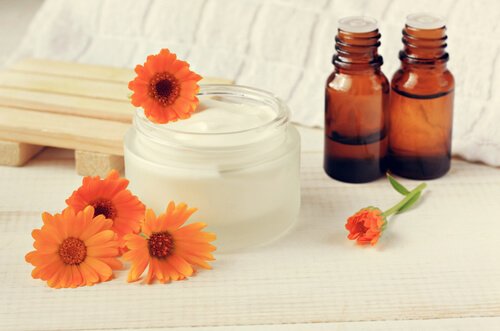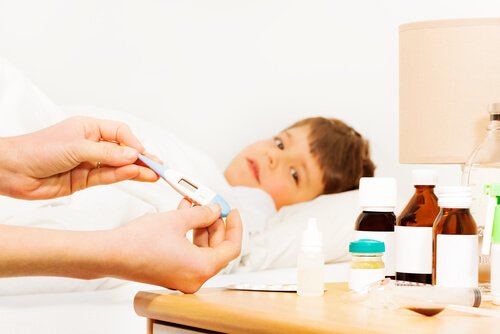5 Natural Remedies That Are Dangerous for Children

Just because something is natural doesn’t mean it’s safe. There are some natural remedies that are dangerous for children.
In general, people think that herbs are harmless because of their natural characteristics, but this isn’t always true. Although they have positive medicinal effects and provide benefits to our bodies, natural remedies can also be potentially dangerous.
A large number of products are marked with the word “natural” on their label. These include food, cosmetics, and cleaning products.
Among these products, what stands out is the way that natural remedies are used, considering the fact that they’re sold without a prescription and eventually administered to children.
Herbal or natural medicine, as its commonly known, is the use of plants to fight ailments or diseases. Generally, you can take them orally in capsules or tablets, as infusions, or applied to the skin in the form of ointments and oils.
Can children consume medicinal plants?
It’s common practice to use certain plants that are considered medicinal to combat minor health issues in children. The most frequent illnesses that are treated include cramps, diarrhea, flu and cold, stomach pain, and even asthma.
However, no matter how common their use is, natural remedies can be dangerous for children. Not only can they cause side effects, but little ones have a vulnerable immune system, which can be easily affected.
There are studies claiming that certain plants that are considered medicinal can cause adverse reactions in children. You should take their age and weight into account before giving them any kind of medication.
Always remember that a child’s metabolism isn’t very mature and may present sensitivity. Intoxication is one of the most common symptoms.

5 natural remedies that are dangerous for children
Star anise
Mothers usually use star anise to prevent gas, especially in young kids. It’s common practice to add a little bit of this infusion into baby bottles to relieve those spasms.
You must take into account that star anise infusions can have harmful side effects in kids. It can cause heartburn, nausea, and vomiting, for example.
Epazote
Of Mexican origin, epazote has always been recommended to eliminate certain parasites and intestinal worms in children. It’s suggested to be consumed as a tea on an empty stomach.
In reality, this plant is highly toxic and can endanger the lives of children under 5 years of age. The main symptoms are abdominal pain, dizziness, and vomiting.
Chamomile
This plant is widely used to make tea. Nonetheless, chamomile tea affects children’s intestines. In high doses, it could cause vomiting, severe diarrhea, and even dehydration.
“As common as their use can be, natural remedies can be dangerous for children due to the side effects they can cause, among other things.”
Willow
People recommend willow to treat many ailments, but above all to fight aches and fevers. It has a high content of salicin, which gives it analgesic properties.
People normally use willow to make tea. Mothers generally administer it to children when they have flu-like symptoms or colds.
Willow tea isn’t suitable for kids between 0 and 12 years of age due to the fact that consuming plants with salicylates is very dangerous.
Salicylate is the same component found in aspirin and it can have serious consequences for your liver and brain. This active ingredient can also cause gastritis and stomach ulcers.

Castor oil
A high percentage of cases involving child intoxication by natural remedies is due to essential oils, whether used externally or ingested. These oils are completely inadvisable for little ones in the house.
Castor oil is used as a laxative, therefore it’s customary to give it to children who have chronic constipation. This practice can produce serious adverse effects in children, such as intestinal obstructions, bronchial diseases, severe diarrhea, and abdominal pain.
As we’ve seen, there are certain natural remedies that are dangerous for children, so we must always consult with a pediatrician about any natural medication or drug.
Remember, recommended doses for an adult could be harmful for an infant or a child under 5 years old. The side effects of medicinal plants can worsen the child’s condition or the symptoms.
Just because something is natural doesn’t mean it’s safe. There are some natural remedies that are dangerous for children.
In general, people think that herbs are harmless because of their natural characteristics, but this isn’t always true. Although they have positive medicinal effects and provide benefits to our bodies, natural remedies can also be potentially dangerous.
A large number of products are marked with the word “natural” on their label. These include food, cosmetics, and cleaning products.
Among these products, what stands out is the way that natural remedies are used, considering the fact that they’re sold without a prescription and eventually administered to children.
Herbal or natural medicine, as its commonly known, is the use of plants to fight ailments or diseases. Generally, you can take them orally in capsules or tablets, as infusions, or applied to the skin in the form of ointments and oils.
Can children consume medicinal plants?
It’s common practice to use certain plants that are considered medicinal to combat minor health issues in children. The most frequent illnesses that are treated include cramps, diarrhea, flu and cold, stomach pain, and even asthma.
However, no matter how common their use is, natural remedies can be dangerous for children. Not only can they cause side effects, but little ones have a vulnerable immune system, which can be easily affected.
There are studies claiming that certain plants that are considered medicinal can cause adverse reactions in children. You should take their age and weight into account before giving them any kind of medication.
Always remember that a child’s metabolism isn’t very mature and may present sensitivity. Intoxication is one of the most common symptoms.

5 natural remedies that are dangerous for children
Star anise
Mothers usually use star anise to prevent gas, especially in young kids. It’s common practice to add a little bit of this infusion into baby bottles to relieve those spasms.
You must take into account that star anise infusions can have harmful side effects in kids. It can cause heartburn, nausea, and vomiting, for example.
Epazote
Of Mexican origin, epazote has always been recommended to eliminate certain parasites and intestinal worms in children. It’s suggested to be consumed as a tea on an empty stomach.
In reality, this plant is highly toxic and can endanger the lives of children under 5 years of age. The main symptoms are abdominal pain, dizziness, and vomiting.
Chamomile
This plant is widely used to make tea. Nonetheless, chamomile tea affects children’s intestines. In high doses, it could cause vomiting, severe diarrhea, and even dehydration.
“As common as their use can be, natural remedies can be dangerous for children due to the side effects they can cause, among other things.”
Willow
People recommend willow to treat many ailments, but above all to fight aches and fevers. It has a high content of salicin, which gives it analgesic properties.
People normally use willow to make tea. Mothers generally administer it to children when they have flu-like symptoms or colds.
Willow tea isn’t suitable for kids between 0 and 12 years of age due to the fact that consuming plants with salicylates is very dangerous.
Salicylate is the same component found in aspirin and it can have serious consequences for your liver and brain. This active ingredient can also cause gastritis and stomach ulcers.

Castor oil
A high percentage of cases involving child intoxication by natural remedies is due to essential oils, whether used externally or ingested. These oils are completely inadvisable for little ones in the house.
Castor oil is used as a laxative, therefore it’s customary to give it to children who have chronic constipation. This practice can produce serious adverse effects in children, such as intestinal obstructions, bronchial diseases, severe diarrhea, and abdominal pain.
As we’ve seen, there are certain natural remedies that are dangerous for children, so we must always consult with a pediatrician about any natural medication or drug.
Remember, recommended doses for an adult could be harmful for an infant or a child under 5 years old. The side effects of medicinal plants can worsen the child’s condition or the symptoms.
All cited sources were thoroughly reviewed by our team to ensure their quality, reliability, currency, and validity. The bibliography of this article was considered reliable and of academic or scientific accuracy.
- Silva Lima SC., Oliveira de Arruda G., Dias Renovato R., Martins Alvarenga MR., Representaciones y usos de las plantas medicinales en mayores. Rev Latino-Am Enfermagem, 2012.
- Aspirin. LactMed [Internet], 2006.
This text is provided for informational purposes only and does not replace consultation with a professional. If in doubt, consult your specialist.








